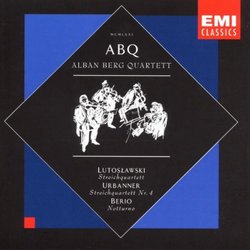| All Artists: Alan Quartet Berg, Berio, Lutoslawski Title: String Quartet Members Wishing: 0 Total Copies: 0 Label: EMI Classics Imports Release Date: 4/15/1997 Genre: Classical Styles: Chamber Music, Historical Periods, Classical (c.1770-1830) Number of Discs: 1 SwapaCD Credits: 1 UPC: 724355636324 |
Search - Alan Quartet Berg, Berio, Lutoslawski :: String Quartet
 | Alan Quartet Berg, Berio, Lutoslawski String Quartet Genre: Classical
|
Larger Image |
CD Details |
CD ReviewsSobre m�sicos y m�sica contemporanea Reinaldo Alan�z | Mexico | 01/06/2002 (5 out of 5 stars) "Estos 3 compositores, 2 de ellos aun vivos, al menos hasta este día, son destacados por su aportación musical moderna. Berio, gran experimentador y compositor nos deleita con este cuarteto profundo y maravilloso. Urbanner, interesante, profundo, fino, casi etereo, nos proporciona este cuarteto, inteligente y maravilloso. Finalmente Lutoslawski, fallecido ya, propone un esquema musical moderno, interesante, fundamental para la comprensión de la música del ya pasado siglo XX y de lo que será la del siglo XXI. Ojalá puedas adquirir esta maravillosa colección, escucharla después de los cuartetos de Bartok y antes de los últimops de Beethoven :)" Two great contemporary string quartets by this prince of Str Discophage | France | 01/10/2009 (5 out of 5 stars) "Judging from the number of recordings, Lutoslawski's String Quartet from 1964 (written for and premiered by the Lasalle Quartet) must be one of the most popular contemporary compositions in the form. It is a great piece, original both in its architecture (an introductory movement made up of short episodes separated by a kind of refrain in the form of short and violent chordal outbursts, and a main movement falling in two sections, a furioso followed by a kind of slow dirge, and a short recapitulation) and its timbral and coloristic invention. In it the composer applies his recently invented "controlled aleatorism", by which the performers, starting together at given cue points, are granted limited freedom in their rhythms (at first the composer even refused to bind the separate parts in a complete score and did so only upon the insistence of the Lasalle Quartet). The liner notes appropriately call it "rhythmically elastic polyphony". I've listened to six different versions (two by the Lasalle, plus the Varsovia, New Leipzig, Arditti and this one) and, quite frankly, without a score, the differences in interpretation aren't striking - much less than, for instance, in Penderecki's two String Quartets from 1960 and 1968.
The CD reproduces a short typed note by Lutoslawski (in French) in which he thanks the Alban Berg Quartet for their interpretation (a concert given in 1990. The present recording was made five years later), stating that "it will probably never be equalled". In the introductory movement, though, I found the sonic perspective is a bit distant and too reverberant- the Varsovia and Arditti Quartets are much closer and vivid and thus have more impact. The ABQ is more tonally subtle and lyrical but also more refrained and slightly underpowered: try the viola solo (at 1:54 here), feeling almost staid with the ABQ in comparison with the Arditti's fury (at 2:02) and the Varsovia's power (at 2:12). The New Leipzig Quartet is also superbly powerful in this movement, although with slightly less bite than Varsovia and Arditti. On the other hand the ABQ's main movement is exceptional indeed, the best of all the versions I've heard (with the New Leipzig coming close second): they launch into the first section with headlong fury and do not relent, and their subtle colors and tonal finesse illuminate the second section (starting at 7:44. TT for Lutoslawski's Quartet is here 23:15). The New Leipzig Quartet is a great version and the Blacher 5th Quartet that completes the disc is a fine work, but that disc is unfortunately ruled out by its short TT of 44 minutes. Between the ABQ and the Arditti Quartet, I prefer the latter in the introductory movement and the former in the main movement. So ultimately I am happy to have enough shelve space to accommodate all three. Here are the links to these other recordings: Lasalle 1965: Witold Lutoslawski, Volume Six: Two Studies for Piano / Variations on a Theme of Paganini for 2 Pianos / Five Songs / String Quartet / Epitaph for Oboe & Piano / Grave for Cello & Piano / Partita for Violin & Piano Lasalle 1967: Lutoslawski, Penderecki, Cage, Mayuzumi: String Quartets Varsovia Quartet: The Varsovia Quartet Plays String Quartets from Poland: Szymanowski (Nos. 1 & 2) / Lutoslawski / Penderecki (No. 2) New Leipzig Quartet: String Quartets Arditti Quartet: Lutoslawski: String quartet; Kurtag: Officium Breve in Memoriam Andreae Szervßnszky Op2 The two others Quartets are live recordings (from 1993 and 1994), but you won't notice it until the final applause. Both Quartets were written for the Alban Berg Quartet, Erich Urbanner's (an apparently influential Austrian composer, born in 1936, professor of composition at the Vienna Conservatory) in 1991/2 and Berio's between 1986 and 1993. I don't find Urbanner's 4th Quartet very interesting: this short (13:30) work sounds to me like a cliché of a post-Schoenberg, expressionist work, like late and uninspired Krenek might have written it. I hear nothing distinctive in it. Berio's Third Quartet, "Notturno", quotes a verse by the German poet Paul Celan: "you the silenced word". A Nocturne, maybe, but one depicting a nightmare painted by Goya. Brushed strings, whispered sul ponticello effects, with sudden outbursts like starting out of a dream, body covered with sweat. Neurophysiologists are still debating how long nightmares really last; this one is 23:10. I don't find Berio's Quartet as inventive as Lutoslawski's, but it is very subtle, evocative and poetic. Unlike Lutoslawski's Quartet, I have no other version to compare these readings by the ABQ, but I'll take no great risk in assuming that they are authoritative. For Lutoslawski and Berio this belongs to every serious collection of 20th Century music." |

 Track Listings (4) - Disc #1
Track Listings (4) - Disc #1